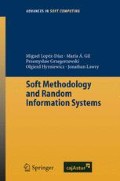Abstract
Debris flows are among the most dangerous and destructive natural hazards that affect human life, buildings, and infrastructures. Starting from the ‘70s, significant scientific and engineering advances in the understanding of the processes have been achieved [4, 7]. Yet, human expertise is still fundamental for hazard identification, as many aspects of the whole process are poorly understood; and the acquisition of evidence about the areas under consideration can only be done vaguely in practice, making it difficult to apply models.
Access this chapter
Tax calculation will be finalised at checkout
Purchases are for personal use only
Preview
Unable to display preview. Download preview PDF.
References
Antonucci, A., Salvetti, A. and Zaffalon, M. (2004). Hazard assess- ment of debris flows by credal networks. Technical Report IDSIA-02–04. http://www.idsia.ch/idsiareport/IDSIA-02-04.pdf.
Campos, L., Huete, J. and Moral, S. (1994). Probability intervals: a tool for uncertain reasoning International Journal of Uncertainty, Fuzziness and Knowledge-Based Systems 2 (2), 167–196.
Costa, J.E. (1984). Physical geomorphology of debris flows (Chapter 9). In: Costa, J.E. and Fleisher, P.J. (Eds.) Developments and Applications of Geomorphology. Springer-Verlag, Berlin, pp. 268–317.
Costa, J.E. and Wiekzorek, G.F. (1987). Debris Flows/Avalanches: Process, Recognition and Mitigation; Vol. 7. Geol. Soc. Am. Reviews in Engineering Geology, Boulder.
Cozman, F.G. (2000). Credal networks. Artificial Intelligence 120, 199–233.
Ferreira da Rocha, J.C. and Cozman, F.G. (2002). Inference with separately specified sets of probabilities in credal networks. In: Darwiche, A. and Friedman, N. (Eds.) Proceedings of the 18th Conference on Uncertainty in Artificial Intelligence (UAI-2002). Morgan Kaufmann, San Mateo, pp. 430–437.
Iverson, R.M., Reid, M.E. and LaHusen, R.G. (1997). Debris-flow mobilization from landslides. Annual Review of Earth and Planetary Sciences 25, 85–138.
Kilchenmann, U., Kyburz, G. and Winter, S. (2001). GEOSTAT user handbook (In German). Swiss Federal Statistical Office, Neuchâtel.
Pearl, J. (1988). Probabilistic Reasoning in Intelligent Systems: Networks of Plausible Inference. Morgan Kaufmann, San Mateo.
Takahashi, T. (1991). Debris Flow. A.A. Balkama, Rotterdam, IAHR Monograph.
Walley, P. (1991). Statistical Reasoning with Imprecise Probabilities. Chapman and Hall, New York.
Walley, P. (1996). Inferences from multinomial data: learning about a bag of marbles. J. R. Statist. Soc. B 58 (1), 3–57.
Author information
Authors and Affiliations
Rights and permissions
Copyright information
© 2004 Springer-Verlag Berlin Heidelberg
About this paper
Cite this paper
Antonucci, A., Salvetti, A., Zaffalon, M. (2004). Assessing Debris Flow Hazard by Credal Nets. In: Soft Methodology and Random Information Systems. Advances in Soft Computing, vol 26. Springer, Berlin, Heidelberg. https://doi.org/10.1007/978-3-540-44465-7_14
Download citation
DOI: https://doi.org/10.1007/978-3-540-44465-7_14
Publisher Name: Springer, Berlin, Heidelberg
Print ISBN: 978-3-540-22264-4
Online ISBN: 978-3-540-44465-7
eBook Packages: Springer Book Archive

